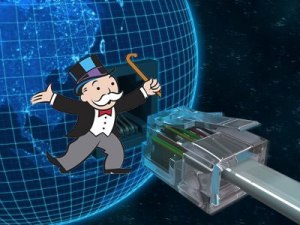 On January 14, the United States Circuit Court of Appeals in the District of Columbia ruled that telecommunications and cable companies can “play favorites” among websites, video channels and all other content providers. This decision struck down FCC rules which tried to make the Internet “neutral,” carrying all kinds of content with equal speed.
On January 14, the United States Circuit Court of Appeals in the District of Columbia ruled that telecommunications and cable companies can “play favorites” among websites, video channels and all other content providers. This decision struck down FCC rules which tried to make the Internet “neutral,” carrying all kinds of content with equal speed.
In other words, if the New York Times pays Verizon (or AT&T, or Comcast or any other company which owns wires) a fee to deliver its content, but Crosscut cannot, www.nytimes.comwill zip onto your computer screen rapidly, whilewww.crosscut.com will ever so slowly and painfully appear. Indeed, if Comcast owns NBC (which it does), NBC’s video content might zoom across Comcast’s wires into homes and businesses, while ABC, CBS, the Seattle Channeland other video feeds stumble slowly onto those same television sets.
It could get even more interesting when you go shopping. Do you want to buy a book or toys or new shoes? Well, if Wal-Mart pays Comcast and CenturyLink to deliver its content, you might seewww.walmart.com rapidly appear on your web browser, while Amazon, Sears and Macys come up slowly — or not at all.
As the Los Angeles Times headlined, “Bow to Comcast and Verizon, Your Overlords”.
All this wouldn’t be so bad, of course, if we…



We’re already seeing this in the wild. Verizon is punishing traffic that it doesn’t directly make revenue off or it doesn’t like. Verizon is throttling Netflix traffic and any traffic from/ to Cogent. If you received your internet service from Cogent, you are being throttled as Verizon & Cogent have a long standing feud over unbalanced peering.